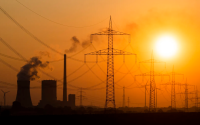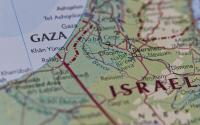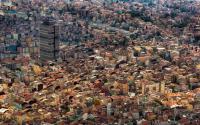Common Dreams / Published on Wednesday, April 16, 2003 by the New York Timesby Ian Fisher
BAGHDAD, Iraq, April 15 — Protests against the American forces here are rising by the day as Iraqis exercise their new right to complain — something that often landed them in prison or worse during President Saddam Hussein's rule.
But no one here is in the mood to note that paradox, as Iraqis confront with greater clarity their complicated reactions to the week-old American military presence here: anger at the looting; frustration at the ongoing lack of everything from electricity to a firm sense of order; fear of long-term United States military occupation.
"Down, down U.S.A. — don't stay, go away!" chanted Ahmed Osman, 30, a teacher among the several hundred Iraqis protesting today in front of the Palestine Hotel downtown, which the marines are both guarding and using as their headquarters to recruit civil servants to reconstruct Iraq's central authority. "Bush is the same as Saddam," he said.
The protest was small compared with the 20,000 who marched today in Nasiriya against the American presence in Iraq, but it was the largest such demonstration in Baghdad yet, prompting the marines to seal off the hotel, and the Sheraton next door, for several hours and to beef up security.
There is no sense that these complaints — in which ordinary Iraqis have begun insistently buttonholing any Westerner who wanders by — are degenerating into violence or an unwillingness to cooperate with the Americans.
But individual protest has almost reached a fever pitch, as scores of Iraqis around the city asked reporters if it was true that Mr. Hussein was now in the United States (the evidence: that Baghdad fell so quickly, a deal must have been struck). They are also, in greater numbers, beginning to blame American soldiers for the looting that has stripped the nation's property bare, from desk chairs to ancient Sumerian artifacts.
"The Americans are the ones who have been looting and taking things out of the stores and giving them to families," said Amer Karim, 30, who was himself selling two industrial ceiling fans and a new telephone in a street market in the Kadhimiya section of Baghdad. "So anyone who is selling these things didn't really loot it."
Iraq's impatience for normalcy is testing the American troops here, who are eager to show that they are trying to meet Iraqis' needs now that the main combat operations are over.
Today, marines and Iraqi soldiers continued the joint patrols against looting that began on Monday, tramping late this afternoon over twisted metal and blasted concrete in front of a bombed government building downtown. Several shots rang out, and marines and Iraqis ran together down the building's side, finding nothing.
"It seems like people are pretty happy to see police on the streets again," said Sgt. Lee Buttrill, 29. "And they are always happy to see us," he added, whether in earnestness or a perfect deadpan, it was hard to tell.
The military said today that it was also close to solving one of the main sources of complaint: the lack of electricity since April 4, which has kept shops and schools closed and thus delayed a return to normal life. The military said it expected power in parts of the city to be restored in the next 48 to 72 hours.
At the same time today, the International Committee of the Red Cross said it expected water service in eastern Baghdad to be restored Wednesday.
In all, order seemed to spread more fully throughout the city today, even amid continuing explosions, gunfire and looting. Traffic jams returned, in some cases worse than before the war because of the military checkpoints and streets still blocked off by local gunmen. Along Jumhuriya Steet, one of the main thoroughfares, more shops were open, with people selling gasoline on the streets and changing money.
But even as the chaos receded, the deep damage is also becoming clearer — as are the complications that Iraq will face in stitching this nation, divided among Shiite, Sunni and Kurd, back together under American administration.






